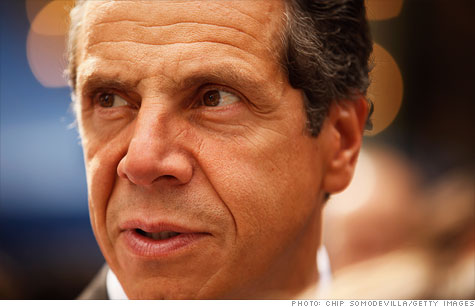Search News

New York Gov. Andrew Cuomo is increasing taxes on millionaires.
NEW YORK (CNNMoney) -- As the "tax the rich" debate rages in Washington D.C., some states are turning to their wealthiest residents to bring in much-needed revenue.
The governors of the two largest Democratic states want rich folks to help close budget gaps. And Democratic lawmakers elsewhere are preparing to do battle with Republican leaders to blunt budget cuts by instituting a millionaire tax.
This marks a shift from last year, when state leaders largely shied away from raising taxes in general. Several cash-strapped states, including Maryland, New Jersey and Oregon, let their millionaire taxes lapse.
But spending cuts alone aren't getting the job done.
"As the effects of the recession linger, states are realizing they can't [balance their budgets] by cutting education, transportation and other investments that create jobs," said Jon Shure, director of state fiscal studies for the left-leaning Center on Budget and Policy Priorities.
After refusing to renew New York's millionaire tax, Governor Andrew Cuomo ended up hiking the levy on the rich anyway. The increased revenue will close about half of the state's $3.5 billion budget gap for the coming fiscal year.
The Empire State had instituted a surcharge in 2009 that raised the top rate to 8.97% for earnings above $500,000. It was scheduled to fall to 6.85% this year.
Instead, Cuomo created new tax brackets that lower the tax rates for those earning less than $300,000. But income above $2 million will be taxed at a new top bracket of 8.82%, nearly two percentage points higher than had been expected. It expires at the end of 2014.
"Whether a person made $20,000 or $20 million, they paid the same rate. It was just wrong -- because a flat tax is not a fair tax," said Cuomo in his State of the State speech earlier this month. "Our principle is simple: the more you make, the higher rate you pay. Today, the middle class is paying the lowest rate in 58 years."
On the other side of the nation, California Governor Jerry Brown built his budget assuming that voters approve a $6.9 billion tax package on the November ballot. He's planning to sell his plan to Golden State residents at his State of the State address on Wednesday.
If the ballot measure passes, three new tax brackets would be created. Single taxpayers would fork over an additional 1 percentage point on earnings over $250,000, 1.5 percentage points on income over $300,000 and 2 percentage points on earnings over $500,000. The higher rates would be in effect for the 2013 through 2016 tax years.
In addition, Brown wants to raise the sales tax by half a percentage point. The added revenues would go to fund schools and public safety, which would otherwise face $5.4 billion in cuts, he said.
In New Jersey, voters favor instituting a millionaire tax by a 2 to 1 margin, according to a Quinnipiac University Poll conducted late last year, marking an all-time high.
Democratic lawmakers, who control the state legislature, are hoping to convince Governor Chris Christie, a Republican, to reinstate a surcharge on the wealthiest residents. He had been staunchly opposed to a similar effort last year, instead instituting deep cuts in spending.
"Despite all the talk about shared sacrifice, the wealthiest residents in our state are the ones who are being asked to sacrifice the least," said state Senator Barbara Buono, who until recently served as majority leader.
But conservatives argue that while raising taxes on the wealthy might bring in more money in the short-term, it could hurt any state's economy in the long run.
"We're skeptical of the idea that high rates do anything but scare people out of the state and limit economic growth," said Joe Henchman, vice president for state projects at The Tax Foundation. ![]()
| Overnight Avg Rate | Latest | Change | Last Week |
|---|---|---|---|
| 30 yr fixed | 3.80% | 3.88% | |
| 15 yr fixed | 3.20% | 3.23% | |
| 5/1 ARM | 3.84% | 3.88% | |
| 30 yr refi | 3.82% | 3.93% | |
| 15 yr refi | 3.20% | 3.23% |
Today's featured rates:
| Latest Report | Next Update |
|---|---|
| Home prices | Aug 28 |
| Consumer confidence | Aug 28 |
| GDP | Aug 29 |
| Manufacturing (ISM) | Sept 4 |
| Jobs | Sept 7 |
| Inflation (CPI) | Sept 14 |
| Retail sales | Sept 14 |